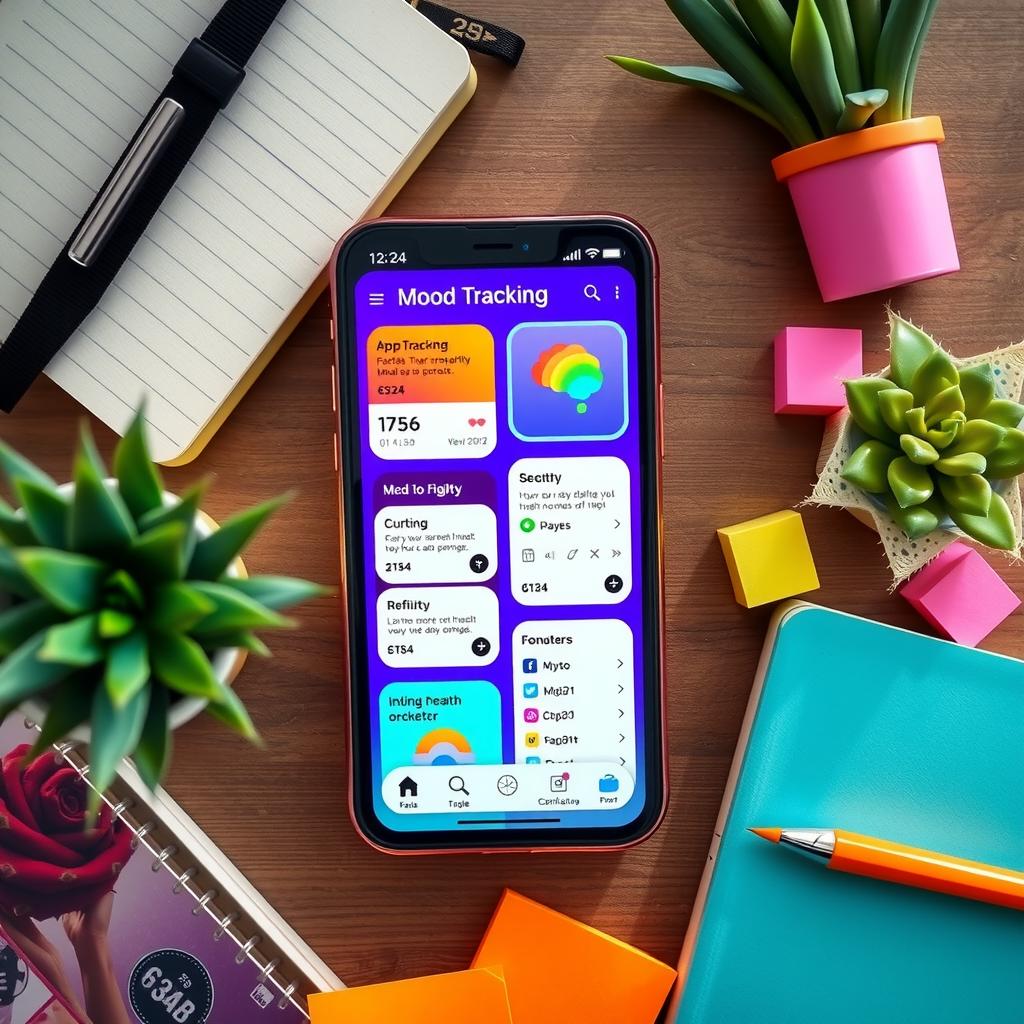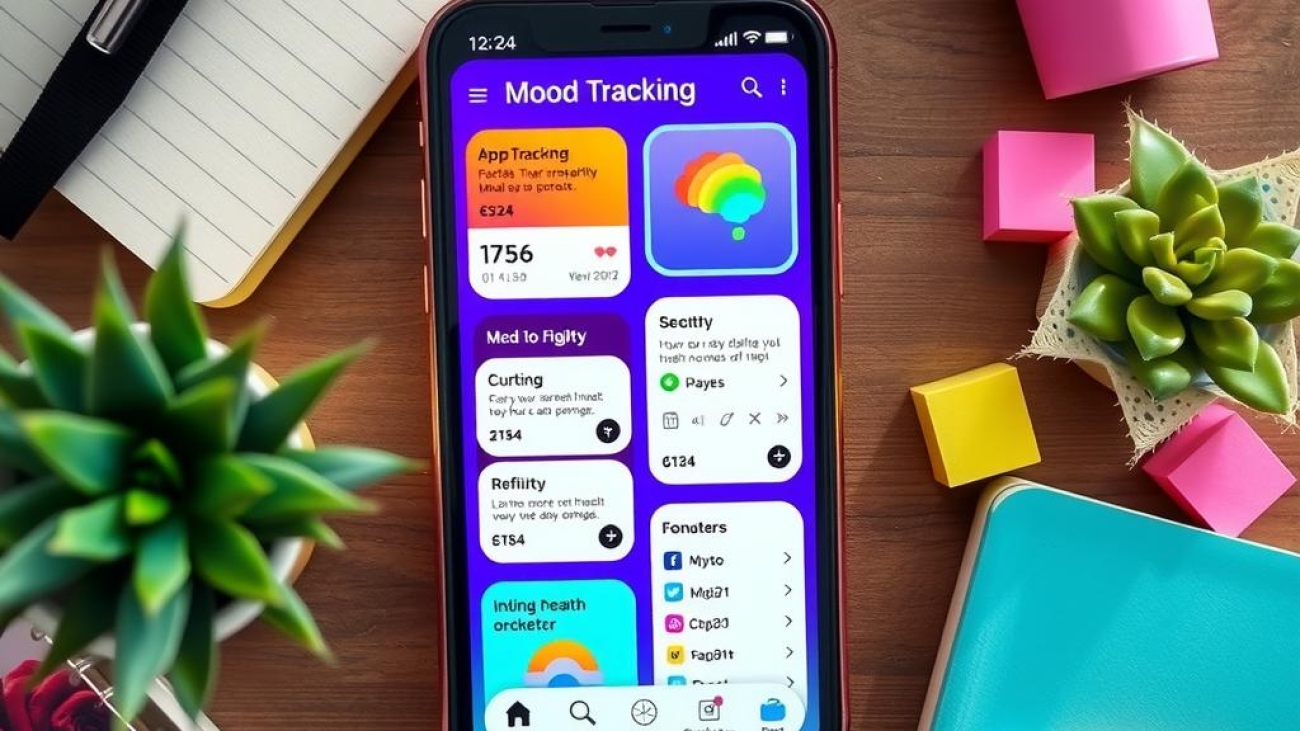In an age where mental health awareness is at its peak, the quest for effective mood tracking tools has become more critical than ever. Many individuals grapple with fluctuating emotions, anxiety management, and the overarching need for stress relief in their daily lives. This growing recognition of the importance of emotional well-being has led to a surge in wellness apps designed specifically to assist users in monitoring their moods and enhancing their overall quality of life. The myriad options available can be overwhelming; thus, discerning which app best aligns with personal needs becomes essential for achieving desired outcomes.
The core value of exploring mood tracking apps lies not only in understanding individual emotional patterns but also in fostering self-awareness that contributes significantly to mental wellness. From simple mood journals that prompt users to reflect on daily experiences to comprehensive platforms offering analytics and actionable insights, these apps serve as powerful self-care tools. They empower users by providing a structured approach to identifying triggers and managing symptoms related to anxiety or stress while promoting productivity enhancement through improved focus on emotional health.
This blog post aims to illuminate key features and functionalities across top-rated mood tracking applications for 2024, enabling readers to make informed decisions tailored to their unique circumstances. By examining aspects such as user experience, design intuitiveness, integration capabilities with other wellness resources, and community support features within these applications, this comparison seeks not just to inform but also inspire proactive engagement with one’s mental health journey.
As we delve into this exploration of leading mood tracking solutions available today—highlighting what sets them apart—we invite readers into a conversation about taking charge of one’s emotional landscape. Join us as we uncover how these digital companions can transform daily routines into insightful practices aimed at fostering healthier relationships with oneself amidst life’s inevitable ups and downs.

Key Points:
- The Importance of Mood Tracking for Mental Health: In the current landscape, where mental health is increasingly recognized as a vital aspect of overall well-being, mood tracking has emerged as an essential practice. Individuals are utilizing various wellness apps to monitor their emotional states, which plays a crucial role in fostering emotional well-being. These tools not only aid in identifying patterns related to moods and feelings but also serve as foundational elements of effective self-care strategies.
- Features Enhancing User Experience: Different mood tracking applications offer unique functionalities that cater to the diverse needs of users. For instance, some apps prioritize simplicity with quick check-ins, making them ideal for those seeking an effortless way to maintain a mood journal. Others provide comprehensive features aimed at deep analysis and detailed reflections on emotions. This range ensures that users can find tools suited specifically for aspects such as anxiety management, stress relief, and productivity enhancement.
- The Role of Analytics in Emotional Regulation: As individuals engage with these innovative wellness apps, they gain valuable insights into their emotional patterns over time through analytics provided by the platforms. Such data-driven approaches empower users to make informed decisions regarding their mental health journeys. By understanding how certain triggers affect their moods or productivity levels, individuals can cultivate better emotional regulation skills and resilience against daily stresses.
These key points illustrate how exploring top mood tracking applications available in 2024 can significantly contribute to one’s journey toward improved mental wellness while enhancing daily life quality through thoughtful engagement with one’s emotional landscape.

Understanding Mood Tracking: The Importance of Emotional Awareness
Embracing Self-Discovery Through Mood Tracking
In today’s fast-paced world, mood tracking has emerged as a vital practice for enhancing mental health and promoting overall emotional well-being. This tool empowers individuals to develop a deeper understanding of their feelings, helping them identify patterns that may contribute to anxiety or stress. By consistently recording emotional states in a mood journal, users can gain insights into the triggers behind their moods, enabling better management of their mental landscape. As research reveals, maintaining awareness of one’s emotions is essential for effective anxiety management and stress relief, fostering healthier coping mechanisms.
Furthermore, numerous wellness apps have been developed specifically to facilitate this process. These self-care tools often incorporate features that allow users to log daily moods alongside contextual factors such as sleep quality, diet, and physical activity. Such comprehensive data collection enhances the user experience by providing personalized feedback and actionable strategies for improvement. The integration of mood tracking within these platforms not only serves as an avenue for reflection but also encourages proactive measures towards better emotional regulation.
The significance of mood tracking extends beyond mere observation; it plays a crucial role in productivity enhancement and personal development. When individuals are attuned to their emotional fluctuations, they can make informed decisions about when to tackle challenging tasks or when it might be wise to take breaks for self-care activities. This heightened awareness cultivates resilience against burnout while simultaneously paving the way for more fulfilling life experiences.
Moreover, engaging with one’s emotions through consistent mood monitoring fosters an environment conducive to growth and healing. Individuals who actively track their moods often report improvements in relationships due to increased empathy toward themselves and others—a testament to how emotional awareness positively affects interpersonal dynamics. In essence, mood tracking acts as both a mirror reflecting one’s inner state and a map guiding individuals on their journey toward improved mental health.
In conclusion, embracing the practice of mood tracking can significantly enhance one’s understanding of personal emotions while offering tools necessary for navigating life’s challenges effectively. As more people turn towards technology-driven solutions like wellness apps designed with user-friendly interfaces tailored specifically for this purpose—recognizing the importance of making emotion-focused reflections part of everyday life becomes increasingly crucial in cultivating sustainable emotional well-being.
Top Mood Tracking Apps in 2024: Features and Benefits
Discovering the Best Tools for Emotional Well-Being
In an increasingly fast-paced world, the importance of mood tracking has gained significant traction as individuals seek to enhance their mental health and overall wellness. The landscape of mood-tracking applications in 2024 presents a diverse array of functionalities tailored to various user needs. For instance, some apps integrate sophisticated algorithms that analyze patterns over time, providing users with insights into how their emotions correlate with daily activities or external factors such as weather changes and social interactions. These features not only support users in identifying triggers for anxiety or stress but also empower them with personalized recommendations for managing their emotional well-being effectively.
Unique Functionalities Addressing User Needs
One standout feature among top mood tracking apps is the incorporation of mood journals, allowing users to document their feelings on-the-go. This functionality encourages reflection and self-awareness, vital components for effective anxiety management and stress relief strategies. Additionally, many apps offer customizable prompts that guide users through exploring specific emotions or experiences, enhancing engagement while fostering a deeper connection to one’s mental state. Furthermore, gamification elements within these platforms motivate users to maintain consistent usage by rewarding them for regular logging and self-reflection—a crucial aspect when aiming for long-term improvements in emotional health.
Enhancing Productivity Through Emotional Insight
Another remarkable benefit offered by leading wellness apps is the integration of productivity enhancement tools that align emotional insights with daily tasks. By analyzing mood data against work performance metrics—such as completed tasks versus reported feelings—users can identify optimal working conditions that boost focus and efficiency. Such capabilities are particularly valuable during periods characterized by high-stress levels or potential burnout risks; understanding which situations lead to decreased productivity enables proactive adjustments aimed at safeguarding one’s mental health while maintaining professional responsibilities.
Community Support Features Driving Connection
A notable trend emerging from modern mood tracking applications is the emphasis on community support features designed to foster connections among users facing similar challenges regarding emotional well-being. Many platforms facilitate forums where individuals can share experiences related to mental health struggles or coping strategies they’ve found beneficial. This sense of belonging cultivates an environment conducive not only to personal growth but also collective healing—allowing participants access to invaluable peer support alongside traditional self-care tools.
Comprehensive Insights Through Data Visualization
Lastly, advanced data visualization techniques employed by top-tier mood tracking applications ensure clarity when interpreting detailed reports generated from logged moods over time. Users can easily identify trends via charts showing fluctuations correlated with lifestyle choices like sleep habits or dietary intake—the clear representation makes it easier than ever before for individuals striving towards better control over their states of mind through informed decisions based on tangible evidence about what works best personally within each unique journey toward holistic wellness.
Through a comprehensive evaluation framework focusing on key aspects such as user experience design, feature richness catering specifically towards individual preferences regarding emotion monitoring practices combined seamlessly into everyday life; these innovative solutions highlight exciting progress made across this burgeoning field dedicated towards improving both our understanding—and management—of fundamental human emotions essential for thriving amidst contemporary stresses inherent within today’s society.
The Intersection of Mood Tracking and Productivity Enhancement
Understanding the Role of Emotional Regulation in Daily Life
In today’s fast-paced world, balancing mental health with productivity has become a significant challenge for many individuals. Mood tracking applications have emerged as essential tools that not only assist users in monitoring their emotional states but also enhance overall effectiveness in personal and professional realms. These wellness apps serve as a digital mood journal, allowing users to log their feelings consistently while providing insights into patterns over time. By identifying triggers linked to stress or anxiety, users can practice effective anxiety management strategies tailored to their unique experiences. This self-awareness fosters better emotional regulation, enabling individuals to navigate daily tasks with increased focus and clarity—essential components for boosting productivity.
The Benefits of Enhanced Self-Awareness
How Mood Journals Contribute to Improved Mental Health
Using mood tracking tools significantly contributes to improved emotional well-being, which directly correlates with enhanced productivity levels. When users regularly engage with these applications, they develop a deeper understanding of their emotions and reactions throughout various situations. This heightened self-awareness allows them to implement necessary adjustments in real-time, be it through mindfulness practices or other self-care tools available within the app ecosystem. Moreover, by documenting moods alongside daily activities or accomplishments, users can recognize what environments or interactions foster positive feelings versus those that induce stress or anxiety—a vital aspect when seeking balance between work demands and personal life satisfaction.
Cultivating Resilience Through Emotional Insights
Mood Tracking Apps as Essential Stress Relief Tools
The integration of wellness apps into everyday routines provides invaluable support for managing stress effectively. Users benefit from tailored features such as reminders for breaks during intense work periods or prompts encouraging reflection on positive achievements throughout the day. Notably, these functions help mitigate overwhelming feelings that often accompany demanding workloads by promoting healthy habits aimed at relaxation and rejuvenation. Additionally, accessing personalized reports generated from recorded data empowers individuals to identify long-term trends affecting both mental health and output efficiency—ultimately guiding them toward making informed lifestyle changes conducive to sustained resilience against challenges.
Driving Productivity Through Emotional Balance
Leveraging Technology for Enhanced Work Performance
Ultimately, leveraging technology like mood tracking applications plays an instrumental role in achieving an optimal balance between mental health maintenance and productivity enhancement across different spheres of life. As modern professionals grapple with increasing demands placed upon them—from tight deadlines at work to maintaining relationships outside office hours—the ability provided by these tools cannot be understated; they offer avenues not just for reflection but actionable insights leading towards improved performance outcomes over time without sacrificing one’s well-being along the way. Therefore, adopting such innovative approaches stands out as increasingly relevant amidst growing recognition around the significance of emotional regulation—serving both individual aspirations while contributing positively towards broader workplace cultures focused on employee wellness.
Frequently Asked Questions:
Q: What are mood tracking apps and how do they support emotional well-being?
A: Mood tracking apps are digital tools designed to help individuals monitor their emotions over time. They enable users to maintain a mood journal, providing insights into emotional patterns and triggers. By facilitating regular check-ins on feelings, these applications play a vital role in supporting overall mental health and can be essential for effective self-care strategies.
Q: How can mood tracking apps assist with anxiety management?
A: Many wellness apps include features specifically aimed at assisting users with anxiety management. These may involve customizable prompts that encourage reflection, mindfulness exercises, or even community support forums. By logging moods and identifying stressors, users can better understand their emotional responses and develop coping strategies tailored to their unique needs.
Q: What should I look for when choosing a mood tracking app?
A: When selecting the right mood tracking app, it’s important to consider user experience aspects such as ease of navigation, available features like analytics for pattern recognition, and integration options with other self-care tools. Additionally, evaluating how an app promotes productivity enhancement alongside its primary functions will aid in finding one that fits seamlessly into daily life while effectively supporting emotional well-being.

Add a Comment